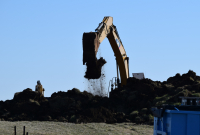Canada lent billions to oil, gas and mining companies. Then it made a profit

On the same day that President Barack Obama rejected TransCanada Corp’s proposed Keystone XL pipeline, a Canadian Crown corporation threw the company a lifeline.
Export Development Canada (EDC), a taxpayer-owned organization that operates as a commercial investment bank, signed two deals on that day — Nov. 6, 2015 — offering between $150 million to $350 million in loans to TransCanada, a Calgary-based company.
The timing was purely coincidental. The deals renewed an annual arrangement with the Crown corporation, which is part of a syndicate of about 20 financial institutions that are supporting TransCanada Pipelines in the U.S.
EDC signed more than $28 billion in deals with oil, gas and mining companies
Large multinational corporations regularly take out short-term loans for operations. Some of them in Canada get help from EDC for their activities abroad.
But deals like these illuminate the surprisingly symbiotic relationship between industry and the federal government. EDC has provided more than $28 billion worth of financial support to Canadian oil, gas, metals and mining companies since 2015, helping along some of the country’s industry giants. These include companies such as Cenovus, ConocoPhillips, Crescent Point Energy, Enbridge, Encana, Husky, Spectra Energy and Suncor.
The deals support industry jobs and the economic benefits that go with them. They also help generate a healthy revenue stream for the government through interest payments.
Karyn Keenan is a lawyer and the Ottawa-based director of Above Ground, an advocacy organization that researches the operations of Canadian multinational corporations abroad in order to promote accountability. Keenan says this support may run counter to other government policies, including pledges to improve Canada's record on climate change and phase out fossil fuel subsidies, as well as its general stance against human rights abuses.
It's a case of the government's right hand not knowing what the left had was doing, she says.
“It means the Canadian public is making money off of loans to oil, gas and mining companies, many of whom are doing awful things… and trashing the planet,” she tells National Observer. “It’s inappropriate that the Canadian government is making money off of those things.”
The public knows little about what the companies do with the loans and financing deals they receive from their tax dollars. In the case of the most recent loans offered to TransCanada, EDC's website only says the money can be used for “general corporate purposes” or “support for working capital.” This essentially means that the company can, in theory, use it for any purposes in the U.S., including lobbying, advertising, general operating costs or legal action.

EDC has an internal reporting process when it signs these agreements so it gets more details about how the companies are using loans. It normally declines to disclose this information in order to protect what it says are the business secrets of its clients.
Although TransCanada wouldn't necessarily need EDC to step in financially, since it already had about 20 other banks providing it with short-term credit, the government-backed support of the Crown corporation also provides political cover, says Keenan, allowing the company to put the Canadian government's brand on its projects.
"There’s no shortage of financial institutions out there, so why do we have a Crown corporation that’s mimicking a commercial bank?" Keenan asks.
Forsyth, a spokesperson for EDC, says that the Crown corporation is supporting oil and gas companies since they provide important benefits for Canadians.
“Oil and gas plays an important role in Canada’s export picture and sustains approximately 700,000 Canadian jobs annually. As a result, [it] is an important sector for EDC,” he explains.
The Crown corporation also supports other sectors of the economy. In 2015, it provided $104.2 billion in total financial support to Canadian companies. This included:
- Information and Communication Technology companies: $4.9 billion
- Infrastructure and Environment companies: $25.8 billion
- Light Manufacturing companies: $9.7 billion
- Agriculture, Fisheries and Forestry companies: $24.3 billion
- Transportation companies: $16.8 billion
Forsyth says that all of EDC's deals generated dividends that translated into new revenues for the federal government — $500 million in 2016 and $1.1 billion in 2014. The money goes back into government coffers to help it balance its budget.
He says EDC usually targets smaller companies to help them export products, but when asked why the Crown corporation was also giving many large corporations support, he says it was because these companies can also provide new business for other Canadian businesses through their ventures abroad.
EDC projects can have "significant" or "unprecedented" adverse effects
Keenan's organization however, has also examined a range of mining projects supported by EDC and questions whether the federal organization does the right type of screening to avoid the wrong types of projects.
"For 20 years, we've been questioning their policies," she says. "We think they're inadequate... we don't think they are nearly robust enough."
Since November 2010, EDC has offered financing to 22 projects abroad with “potential significant adverse environmental or social effects that are sensitive, diverse, or unprecedented.”
This would include an oil refinery in Turkey — the Socar Turkey Aegean Refinery project that is supposed to process about 10 million tons of crude oil per year. EDC says it reviewed the social and environmental impacts of the project and concluded that it would meet or exceed "recognized good practices."
"I can tell you that EDC abides to strong corporate social responsibility (CSR) principles for all of its transactions," says Forsyth. "This means taking into account the impacts — both environmental and social — of the business that we support."







Comments
This makes me ashamed to be Canadian. Particularly when I know that indigenous people in many countries are having to fight for their lands, health and safety against Canadian corporations. It's not safe to wear a maple leaf when travelling to these countries so this practice is, in a way, endangering Canadian lives.
... and where does EDC get the money from to lend it? From the banks? At a higher interest rate. This seems to be a money losing proposition, as well as enhancing oil production and climate change.